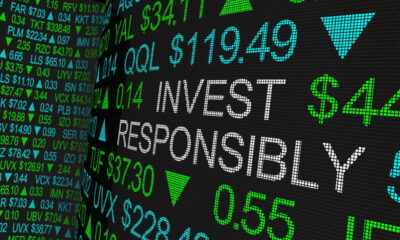

Features
Invest ethically, reap prosperity
Making your money grow whilst helping to save the planet: sounds like the perfect combination right? Alex Blackburne finds out all you need to know about ethical investments.
Ethical investment is one of the fastest growing sectors in financial planning in the UK, with over £11billion of public money tied up in ethical funds.
Making your money grow whilst helping to save the planet: sounds like the perfect combination right? Alex Blackburne finds out all you need to know about ethical investments.
Ethical investment is one of the fastest growing sectors in financial planning in the UK, with over £11billion of public money tied up in ethical funds.
This figure, calculated by the not-for-profit ethical investment research service EIRIS, has almost trebled in the last ten years.
The rise in demand for ethical investments is down to more people recognising the importance of investing ethically, and subsequently acting upon it.
In fact, figures released last week as part of National Ethical Investment Week (NEIW) show that 42% of adults in Great Britain want to ‘make money and make a difference’.
Mark Robertson, head of communications at EIRIS, explained the reasoning behind the rise in prominence of the sector.
“Since the credit-crunch, people are better informed about the impacts that their spending and investments can have, both positive and negative, and more of us are turning to ethical investmentwhich takes a longer-term approach,” he said.
“By avoiding companies with a negative impact, or focusing investment on those providing positive products and services tackling key sustainability challenges, green and ethical funds offer the opportunity to both make money whilst tackling global problems.”
However, UK Sustainable Investment and Finance (UKSIF), who run NEIW, also found that 55% of adults with investments in the UK said “they did not clearly understand what their savings and investments support”.
So, to cater to that group, as well as the 36% of adults with investments “who wanted to know more about impact investing”, what is ethical investment all about?
Ethical Investment
In a nutshell, it means investing in companies which have moral, social and environmentally responsible practices, and/or ruling out any organisations that invest in tobacco, guns or oil, for example.
Animal testing, child labour, genetically modified (GM) crops and producing excessive carbon emissions are other practices which are considered unethical.
The UK’s first ethical unit trust was launched in 1984 by Friends Provident – a year after the establishment of EIRIS – and was labelled a Stewardship Fund.
It may be possible to trace ethical or socially responsible investment back to the 18th century Quakers, although many believe the sector was created in the 1950s, around the time of the Vietnam War.
Back to 2011, and the criterion for modern-day ethical investment varies from fund-to-fund, but shades of green are used to measure the level of strictness.
’Light green’ funds are generally more adaptable when it comes to selecting stocks, and tend not to have rigid guidelines for investors, whilst a ’dark green’ fund is usually more inflexible in its ethical requirements, and in contrast tends to have rigid guidelines in place.
In order to establish whether or not an investment is ethical or not, the sector primarily uses a method called ‘negative screening’.
This involves investigating a company and specifically highlighting the unscrupulous investors, from such things as companies with a poor human rights record, to those dealing in the alcohol or tobacco industries.
It’s about emphasising the unethical dealings within a company.
On the other hand, there is ‘positive screening’, which, as you can probably guess, is where the sector highlights ethical companies – this time focusing on areas such as good ethical employment practices, pollution control and all things to benefit the planet – to determine a company’s ethicalness.
Mike Head, consultant at the Ethical Investors, explained that there was a crucial link to be made when it came to investing ethically.
“The key issue with ethical investment is making the connection between money and morals; how many anti-war protesters hold arms companies in their pension or ISA?
“How many individuals [who don’t actively seek ethical investment] are indirectly but unknowingly holding shares in banks?
“Ethical consumers often avoid activities in the retail arena but completely miss the same action with their money.”
 Ethical ISAs
Ethical ISAs
Mirroring the rise in popularity of ethical investment is the ethical ISA – a tax-free way of saving money,but with one important difference from the regular version, in that your money is used to invest in purely ethical funds.
Isa.co.uk explains how, “Ethical ISA funds are used to invest in unit trusts, gilts, the stock exchange, life assurance and many other similar ventures”, as opposed to possibly investing in tobacco, weapons or oil companies which non-ethical funds might do.
The rates for ethical ISAs might not be the best on the market, but your morals certainly won’t be blemished, with Triodos, one of the leading providers of ethical funds in the UK, boasting how they “only [finance] enterprises which create social, environmental or cultural added value”, in sectors such as “organic food and farming, renewable energy, social housing, and fair trade.”
Ethical Financial Management company, the Ethical Investors, label ISA providers as either neutral or positive, depending on their ethical stance.
Neutral providers are companies such as building societies, who the Ethical Investors deem to be, “Ethically neutral as they do not undertake direct lending to companies and the society exists to benefit its members, rather than shareholders.”
As of October 2011, Leek United, Stafford Railway and Harpenden make up the top three neutral providers on the table.
Meanwhile, positive providers, “Positively vet their customers (meaning those that they loan money to) on social, ethical or environmental grounds,” with Triodos, Ecology Building Society and the Co-operative Bank/Smiletopping the list.
Jon Lee, Business Development Manager at Ecology, explained how where they invested money was the central point to whether or not they subsequently received investment.
“We asked our members why they chose to save ethically with us earlier this year and found that for 40% of them, trust in how we manage their money and confidence in where it goes – and where it doesn’t – was the most important consideration.
“Equal numbers felt that knowing their investment would be put to work specifically towards helping projects that improve the sustainability of our built environment was the top priority.”
Ethical pensions
Ethical pensions, through which an investor is able to save for the future without having a negative social, moral or environmental impact, are also increasingly popular in the UK.
As with the ethical ISAs, a concern in this sector is the return, with many doubters claiming the ethics surrounding ethical pensions often mean the performance quality is sacrificed.
Investment experts, though, deny this, with many maintaining that investing ethically carries with it no financial disadvantages in terms of performance and revenue, and can even see businesses or individual investments performing better than non-ethical ones.
The Ethical Investors’ Ethical Fund Directory, which lists the ethical funds available in the UK to individual investors, and gives ratings in the areas of Environment, Animals and Social, is a great place to start if you’re looking at investing sustainably, whilst YourEthicalMoney.org is the go-to place for all things ethical when it comes to investment, and has practically everything you need to know about the sector on its website.
Otherwise, if you want to know more, phone your IFA, if you have one, or fill in our online form and we will put you in touch with one of our expert panel of specialist financial advisers.
Picture source: epSos.de


 Environment12 months ago
Environment12 months agoAre Polymer Banknotes: an Eco-Friendly Trend or a Groundswell?

 Features11 months ago
Features11 months agoEco-Friendly Cryptocurrencies: Sustainable Investment Choices

 Features12 months ago
Features12 months agoEco-Friendly Crypto Traders Must Find the Right Exchange

 Energy11 months ago
Energy11 months agoThe Growing Role of Solar Panels in Ireland’s Energy Future





























